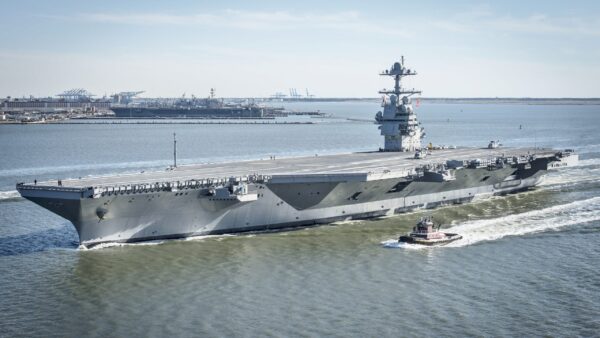The deployment of what the Navy calls the “biggest, baddest warship” is meant as a deterrent against future attacks by any “hostile” actors, the U.S. says.
The United States this week dispatched a group of warships, including the USS Gerald Ford, to support Israel following the attacks by Hamas militants.
Where were they sent specifically?
U.S. Defense Secretary Lloyd Austin announced Sunday that the USS Gerald R. Ford Carrier Strike Group — which includes the namesake aircraft carrier, the guided missile cruiser USS Normandy and four guided missile destroyers (the USS Thomas Hudner, Ramage, Carney and Roosevelt) — would be headed to the eastern Mediterranean Sea.
“Strengthening our joint force posture, in addition to the material support that we will rapidly provide to Israel, underscores the United States’ ironclad support for the Israel Defense Forces and the Israeli people,” Austin said in a statement. “My team and I will continue to be in close contact with our Israeli counterparts to ensure they have what they need to protect their citizens and defend themselves against these heinous terrorist attacks.”
“The U.S. maintains ready forces globally to further reinforce this deterrence posture if required,” he said. “In addition, the United States government will be rapidly providing the Israel Defense Forces with additional equipment and resources, including munitions.”
The strike group arrived Tuesday afternoon, the Pentagon said. The Wall Street Journal reported that another carrier, the USS Dwight D. Eisenhower, was expected to head to the region later this week.
Largest warship ever built
The USS Gerald Ford is the Navy’s newest and most advanced aircraft carrier.
Commissioned in 2017, the ship is named after former President Gerald Ford, who served in the Navy during World War II. Measuring more than 1,100 feet long, 255 feet wide and 250 feet high, the $18 billion vessel is the largest warship ever built.
The 5-acre flight deck can carry up to 90 aircraft, including F-35 fighter jets, The carrier’s size allows it to support up to 90 aircraft, including F-35s, F/A-18 Super Hornets, E-2D Advanced Hawkeyes, EA-18G Growlers, SH-60/MH-60 Seahawk helicopters and other aerial weaponry.
“It’s designed to get more fighter planes in the sky in less time and to be ready to incorporate unmanned aircraft into its air wing,” the Associated Press noted at its christening in 2013.
The ship is powered by two state-of-the-art nuclear reactors and can reach a top speed of over 34 miles per hour.
The Ford is currently on its first combat deployment, with about 4,500 crew members on board. That figure does not include the rest of the strike group, which has roughly 1,500 sailors in its fleet.
‘Biggest, baddest warship’
The movement of what the Navy calls the “biggest, baddest warship” and others to the waters off Israel is meant largely as a deterrent against future attacks against Israel, particularly by Hezbollah, the Lebanon-based militant group that’s allied with Hamas and backed by Iran.
A U.S. official told NBC News earlier this week that the warships, as well as as many as two dozen fighter jets expected to arrive in the region, represent “significant air-to-air and air-to-ground capability to deter any Iranian aggression.”
Gen. Michael “Erik” Kurilla, commander of the U.S. Central Command, said in a statement that the “arrival of these highly capable forces to the region is a strong signal of deterrence should any actor hostile to Israel consider trying to take advantage of this situation.”
“If you think that this is a good time to join in the fight and attack Israel from other fronts, think again,” an Israel Defense Forces spokesman said Monday. “That is the American message, and that is a message that we totally approve.
Yahoo News


Leave a Reply
You must be logged in to post a comment.